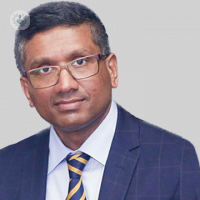Anal fissures: Symptoms, diagnosis and treatment
Written in association with:In this informative article, consultant general surgeon Mr Vijitha Chandima Halahakoon discusses the key signs and symptoms of anal fissures, and also sheds light on the associated diagnostic process and available treatment options.

What is an anal fissure?
An anal fissure is a painful wound at the anal verge.
What are the typical symptoms and signs of an anal fissure?
The typical symptom is intense pain during defecation. Commonly patients describe this as passing glass while defecating. Pain will then last for half an hour or so. Commonly this is associated with bright red blood in the stools. Patients with fissures suffer with constipation too. They may feel a little skin nodule at the anal verge when the fissure is chronic.
What are the potential causes or triggers for developing an anal fissure?
The most common trigger for a fissure is constipation. Hard stools could damage the anal mucosa at defecation leading to a wound. Once someone develops a fissure, the anal muscles go into spasm due to the intense pain. This further perpetuates the fissure by impeding the blood supply to the wound, delaying its healing – leading to a chronic fissure with ongoing symptoms.
However, rarely other perianal conditions like Crohn’s disease and very rarely anal cancers can also cause fissures.
How are anal fissures diagnosed, and what diagnostic procedures are involved?
This is a clinical diagnosis by demonstrating a tender wound at the anal verge on proctoscopy in a patient with typical symptoms.
What are the available treatments and remedies for anal fissures?
The first line of treatments is conservative and symptomatic. The aim is to attack the vicious cycle of constipation-wound-pain-muscle spasm. A good high fibre diet, plenty of water and laxatives are advised to help with constipation and straining. Topical muscle relaxant creams will aim to relax the anal muscles and improve the blood supply to the wound to help healing. Topical local anaesthetic agent ointments are prescribed to help alleviate the pain at the time and after defecation. Majority of the patients (around 95 per cent) will achieve a symptoms relief and healing of the fissure with these conservative options.
However, if the fissure symptoms persist or recurs despite the conservative measures, then other options like injection of Botox (to relax anal muscles temporally till the fissure heals), and different kinds of local tissue flaps to cover the fissure are available. These are performed as day case operations under general anaesthesia.
Historically, sphincterotomies (dividing anal muscles) had been used as a treatment option, but ae rarely used now due to the risk of incontinence.
Are there any lifestyle changes or preventive measures to manage or prevent anal fissures?
Avoiding constipation and straining by keeping your bowel motions soft will prevent you having fissures. Best way to achieve this is drinking plenty of water and eating plenty of fibre.
To schedule a consultation with Mr Halahakoon, visit his Top Doctors profile today.


